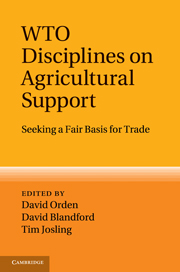Book contents
- Frontmatter
- Contents
- List of figures
- List of tables
- Notes on contributors
- Preface
- List of acronyms
- PART I overview of domestic support issues and WTO rules
- PART II Developed countries: have high levels of support come down?
- 3 European Union
- 4 United States
- 5 Japan
- 6 Norway
- PART III Developing countries: will low levels of support rise?
- PART IV Looking forward: can fair markets be achieved?
- Appendix A Domestic support provisions of the Agreement on Agriculture
- Appendix B Domestic support provisions of the Doha draft modalities
- Index
- References
6 - Norway
Published online by Cambridge University Press: 11 April 2011
- Frontmatter
- Contents
- List of figures
- List of tables
- Notes on contributors
- Preface
- List of acronyms
- PART I overview of domestic support issues and WTO rules
- PART II Developed countries: have high levels of support come down?
- 3 European Union
- 4 United States
- 5 Japan
- 6 Norway
- PART III Developing countries: will low levels of support rise?
- PART IV Looking forward: can fair markets be achieved?
- Appendix A Domestic support provisions of the Agreement on Agriculture
- Appendix B Domestic support provisions of the Doha draft modalities
- Index
- References
Summary
Norway is an economically advanced country in northwestern Europe. The World Bank (2010) has estimated that the country's per capita gross national income was $58,500 in 2008, the second highest in the world. Agriculture's contribution to gross domestic product (GDP) is less than 1 percent and, together with forestry, the sector accounts for roughly 3 percent of employment measured in standard person–years of labor. Less than 3 percent of the land area in Norway is suitable for crops, and of this only one-third is suitable for food grains. Low temperatures and a short growing season produce low yields per hectare. Wheat and potato yields, for example, are only 60 percent of the averages obtained in central Europe. Farmland is scattered around the country. Plots are relatively small and have very steep slopes in some regions. In general, it is difficult for Norwegian agriculture to compete with countries that have a more favorable climate and geography.
Dual objectives of maintaining self-sufficiency in basic products and sustaining small-scale farming throughout the country have long been central to Norwegian agricultural policy. Due to the difficult production conditions, substantial government support is necessary to pursue these objectives. A widely recognized international measure of the support provided to agriculture is the OECD's producer support estimate (PSE). The percentage PSE (value of support divided by the value of farm production) was 62 percent for Norway in 2008, the highest among the Organization's member countries (OECD 2009).
- Type
- Chapter
- Information
- WTO Disciplines on Agricultural SupportSeeking a Fair Basis for Trade, pp. 189 - 220Publisher: Cambridge University PressPrint publication year: 2011
References
- 1
- Cited by



